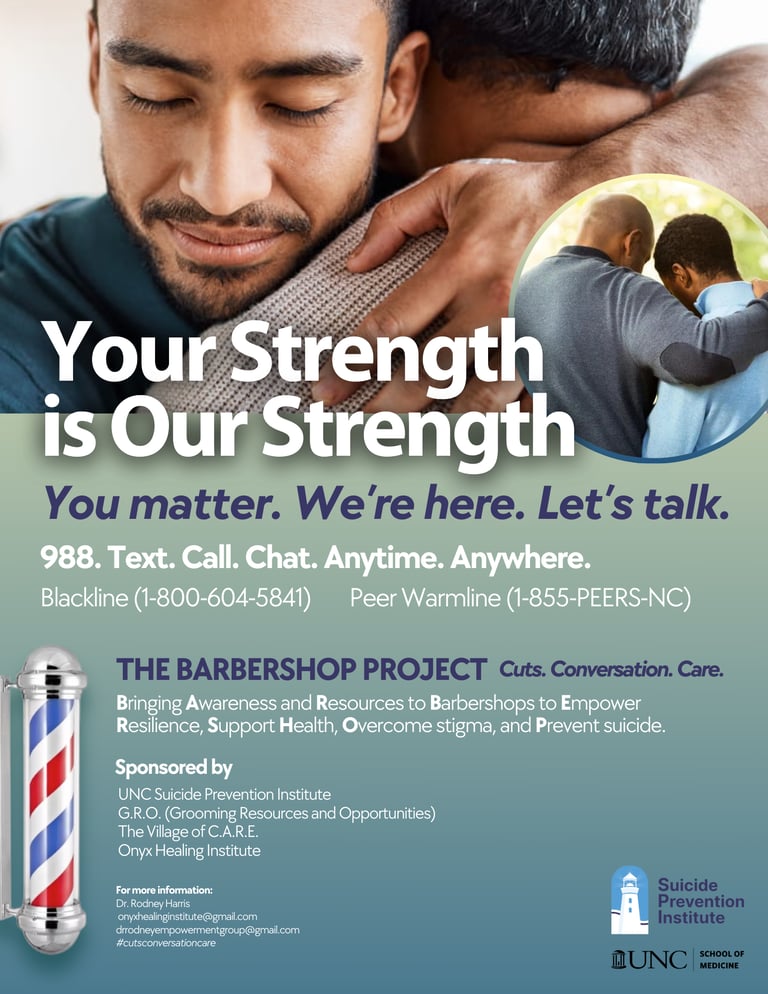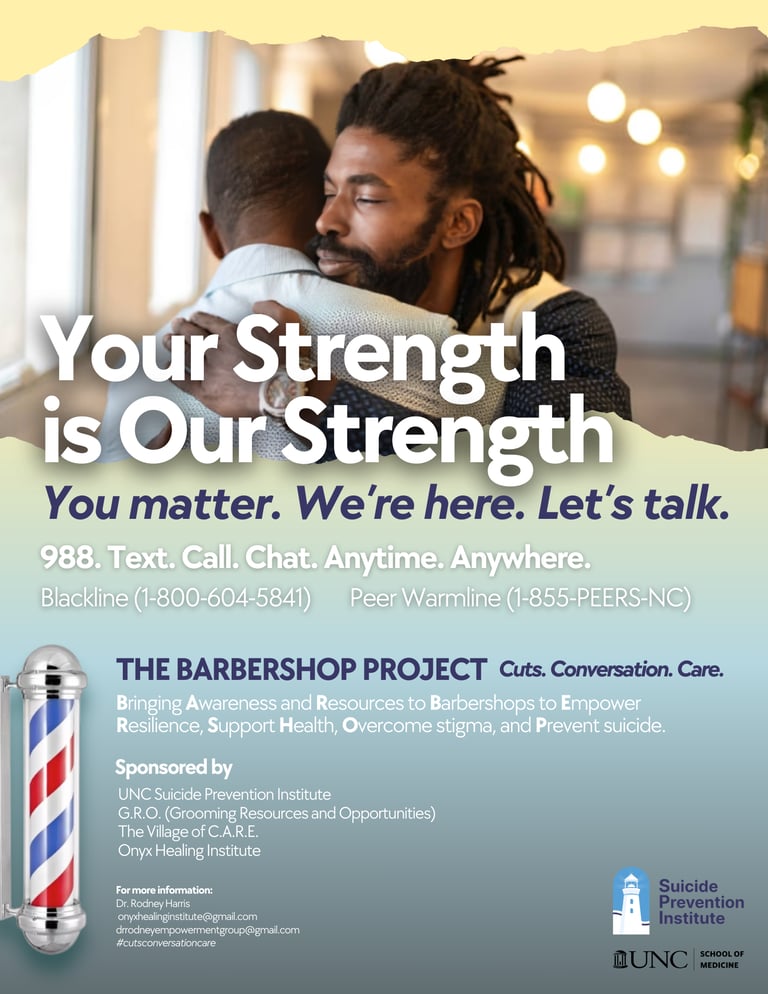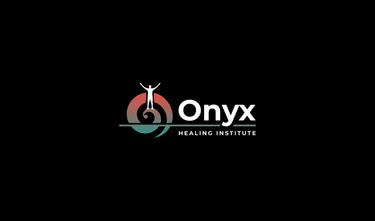Barbershop Research: Creating and Sustaining Brave and Safe Spaces
Focusing on black and brown communities through research and education.
Implementing strategies for effective suicide prevention initiatives.
Partnering with leaders to enhance mental health awareness.
Understanding unique factors affecting suicide risk in populations.




Bringing Awareness and Resources to Barbershops to Empower Resilience, Support Health, Overcome Stigma and Prevent Suicide™
Culturally responsive research and education for black and brown communities.
The goal of this research is to develop and evaluate the efficacy of BARBER SHOP (Bringing Awareness and Resources to Barbershops to Empower Resilience, Support Health Overcome stigma, and Prevent suicide™), a community-based suicide prevention program tailored for Black children and adults that utilizes barbershops as the intervention site. Black individuals in the United States experience a disproportionately high rate of suicide (CDC, 2022), yet face multiple barriers to accessing traditional mental health services. Lindsey et al. (2019) found that individuals in the Black community are less likely to seek professional help for mental health concerns due to stigma, mistrust of the healthcare system, and a lack of culturally relevant services.
Barbershops hold a central role in many Black communities, serving as important social hubs where people gather, converse, and build trust (Brawner et al., 2019). Barbers are trusted and recognize the important dependability they possess (Carlton et al., 2021). The barber chair is also a safe and brave space where black men often confess their deepest secrets and darkest trauma. Barbers are considered a source of support for Black populations and remove the stigma of receiving mental health support (Gelzhiser & Lewis, 2023). Furthermore, barbers and barbershops are places for psychological assistance and suicide prevention (Gelzhiser & Lewis, 2023). The incorporation of suicide prevention services within barbershop settings requires the preceding introduction of physical health awareness and activities into these spaces.
Suicide interventions have not been fully developed or tested in Black communities, and there is a need for culturally appropriate interventions. BARBER SHOP is an evidence-informed intervention that provides culturally relevant mental health and suicide prevention psychoeducation, lethal means prevention, suicide risk assessment, and referrals. We will incorporate CALM (Counseling on Access to Lethal Means), distribute gun locks, utilize the AS Suicide-Screening Questions, and provide referrals for culturally inclusive referrals.




Aim 1: To design and implement the BARBER SHOP program.
Tasks: (1) To design program components, materials, and processes for implementation in the barbershop setting. (2) To create a community collaborative board (CCB) with barbers and community members. (3) To gather feedback from the CCB for the implementation of the intervention. (4) To identify the zip code(s) for inviting barbershops for participation and invite them to participate in the intervention. (5) To implement the intervention and refine processes.
Aim 2: Evaluate the BARBER SHOP intervention.
Tasks: (1) Assess the number of suicide deaths among Black individuals in the zip code over time using the NC Violent Death Reporting System. (2) Collect data on the number of gunlocks distributed, the number of CALM barbers and community members trained, the number of community members receiving CALM, the number of suicide screenings, and the number of individuals referred for suicide-prevention services. (3) Assess secondary outcomes of client satisfaction, cultural humility, engagement, and access.
Community Initiative: Health Fair
Project Overview: Suicidality and mental health needs remain disproportionately higher in Black and Brown and LGBTQ+ communities across the United States, and in North Carolina. The E.T.C. Group is well-connected to diverse community and faith-based organizations across Central North Carolina and has a track record of providing successful community-based trainings to help address mental health concerns.
In Wake, Franklin, Alamance, and Guilford Counties, the E.T.C. will plan and implement:
-4 community-based health fairs as part of the B.A.R.B.E.R.S.H.O.P. project-
3 C.A.L.M Trainings
By implementing these evidence-based trainings, the E.T.C. Group plans to increase mental health literacy, suicide prevention skills, and means restriction education within the target community. Budget and project details below reflect professional training needs balanced with a commitment to offering widespread access by or with an experienced, credentialed and licensed professional.
Partnership with Blue Cross and Blue Shield of North Carolina.
BARBER SHOP (Bringing Awareness and Resources to Barbershops to Empower Resilience, Support Health, Overcome Stigma, and Prevent Suicide)™
Introduction
Black communities in the United States face significant disparities in mental health outcomes, particularly concerning suicide. According to the Centers for Disease Control and Prevention (CDC, 2022), suicide rates among Black children and adults have been steadily increasing. Black children and adults face multiple barriers to accessing traditional mental health services. Black individuals are less likely to seek traditional mental health care due to a range of structural and cultural barriers. These include stigma around mental illness, a deep-rooted mistrust of the healthcare system, and a lack of access to culturally relevant mental health services (Lindsey et al., 2019).
Barbershops represent a powerful and underutilized setting to address these disparities. More than grooming establishments, they are trusted community anchors and informal gathering spaces where Black men in particular feel safe to share personal challenges. Research shows that barbers are often perceived as confidants, mentors, and gatekeepers of community wellness (Brawner et al., 2019; Carlton et al., 2021). Conversations in the barber chair are candid, personal, and often therapeutic in nature. Building upon this foundation, the BARBER SHOP program proposes to transform these culturally significant spaces into hubs of suicide prevention and mental health support.
The goal of this research is to develop and evaluate the efficacy of BARBER SHOP (Bringing Awareness and Resources to Barbershops to Empower Resilience, Support Health, Overcome stigma, and Prevent suicide),™ a community-based suicide prevention program tailored for Black teens and adults that utilizes barbershops as the intervention point. Jalloh et al. (2023) asserted that 77% of barbers serving predominantly black consumers would refer clients in emotional duress; and the barbers were amenable to free mental health training and/or promotion of psychoeducational materials, flyers, and posters in their shops. Lindsey et al. (2019) found that Black men were less likely to seek professional help for mental health concerns due to stigma, mistrust of the healthcare system, and a lack of culturally relevant services.
Program Overview
BARBER SHOP (Bringing Awareness and Resources to Barbershops to Empower Resilience, Support Health, Overcome Stigma, and Prevent Suicide)™ is an innovative, evidence-informed, community-based mental health initiative. It aims to address the mental health and suicide prevention needs of Black communities by embedding culturally tailored interventions directly into barbershop settings. This program integrates psychoeducation, risk screening, lethal means safety, and referral pathways, all facilitated by trained barbers and community stakeholders.
The program will incorporate the CALM (Counseling on Access to Lethal Means) framework to promote gun safety and distribute gun locks; implement ASK (Suicide-Screening Questions) for standardized risk identification; and create pathways for referrals to culturally competent mental health providers. These components will be adapted through participatory collaboration with community members to ensure cultural resonance and sustainability.
Specific Aims
Aim 1: Design and Implement the BARBER SHOP Program
Objective: To develop and pilot a culturally responsive suicide prevention intervention delivered in barbershops located in predominantly Black communities.
Tasks:
Design Intervention Materials – Develop psychoeducational resources, suicide screening protocols, safety planning guides, and training curricula for barbers.
Form a Community Collaborative Board (CCB) – Engage barbers, community leaders, mental health professionals, and residents to guide program design, ensure cultural appropriateness, and foster local buy-in.
Feedback and Iteration – Utilize input from the CCB to refine intervention tools and implementation strategies.
Barbershop Recruitment – Identify high-need zip codes with elevated suicide rates among Black residents. Recruit local barbershops and secure participation.
Program Launch – Implement the intervention in selected sites and monitor fidelity, feasibility, and community engagement.
Aim 2: Evaluate the Effectiveness of the BARBER SHOP Intervention
Objective: To assess the impact of the intervention on suicide prevention outcomes and community engagement.
Tasks:
Outcome Tracking – Use the North Carolina Violent Death Reporting System (NC-VDRS) to track suicide rates in the targeted zip codes over time.
Program Metrics – Collect quantitative data on:
Number of gun locks distributed
Number of CALM-trained barbers and community members
Number of suicide screenings conducted
Number of mental health referrals made
Client and Community Feedback – Assess client satisfaction, perceived cultural relevance, and the degree to which barbers and clients feel supported and empowered by the intervention.
Process Evaluation – Identify barriers and facilitators to implementation, with attention to engagement, sustainability, and cultural responsiveness.
Significance
The BARBER SHOP intervention is both timely and necessary. Traditional approaches to suicide prevention have largely failed to engage Black communities due to systemic exclusion and the absence of culturally adapted services. Embedding these interventions into barbershops directly addresses the dual challenges of stigma and access by meeting individuals where they already feel safe, supported, and seen.
This program builds upon a growing body of literature highlighting the role of barbershops as public health access points (Gelzhiser & Lewis, 2023). It seeks to formalize and scale what has informally existed for generations: the barbershop as a trusted space for healing and dialogue. By equipping barbers with tools to recognize distress, initiate supportive conversations, and link clients to professional care, BARBER SHOP has the potential to transform suicide prevention in underserved communities.
Furthermore, the program will generate critical data on what works in culturally specific, community-anchored mental health interventions. Findings will support scalability to additional zip codes and may inform broader policy and funding priorities focused on health equity.
Innovation
The BARBER SHOP™ model introduces a novel approach to community-based mental health care, guided by four core innovations:
Cultural Embeddedness: Grounded in community norms, values, and settings.
Trusted Messengers: Leverages barbers as lay mental health advocates.
Integrated Prevention: Combines suicide screening, lethal means safety, and culturally responsive referral.
Community Ownership: Co-created with community members through the CCB to ensure relevance and sustainability.
Conclusion
Black communities in the United States face urgent and growing mental health challenges, compounded by a lack of culturally appropriate services and structural inequities. The BARBER SHOP intervention proposes a bold and culturally grounded solution, bringing life-saving support directly into trusted community spaces. Through the strategic use of barbershops, we aim to overcome stigma, enhance access, and reduce suicide in a population that continues to be overlooked by conventional systems of care.
Additionally, the study would explore the factors that contribute to the program's success, including the role of the barbershop environment, the rapport between barbers and customers, and the cultural relevance of the intervention. The findings from this research could inform the development of scalable, community-based suicide prevention strategies that better address the unique needs of Black youth and adults. Previous studies have demonstrated the effectiveness of barbershop-based health interventions, such as the Hair, Heart, and Health program, which successfully increased blood pressure screenings and medication adherence among Black men (Victor et al., 2018). Project Brotherhood Inc. and the Confess Project have successfully facilitated mental health workshops in barbershops to get black men talking and serve as community advocates (Daniel, 2019; Moore et al., 2016). Our project will address suicide/mental health – both in the shop and in the community. We plan to leverage our 10+ years of community engagement with the barber shop to further develop and expand our program. We have identified every barbershop in the State of NC, and have a partnership with the Barber and Cosmetology Board of North Carolina. We have established a multidisciplinary team approach to Bring Awareness and Resources to Barbershops to Empower Resilence Support Health Overcome stigma and Prevent suicide.
This pilot will lay the groundwork for broader dissemination and offers a replicable model for addressing mental health inequities in other marginalized communities. By turning barbershops into sites of healing and resilience, BARBER SHOP™ reimagines what community-centered suicide prevention can look like—and who can be a part of it.
